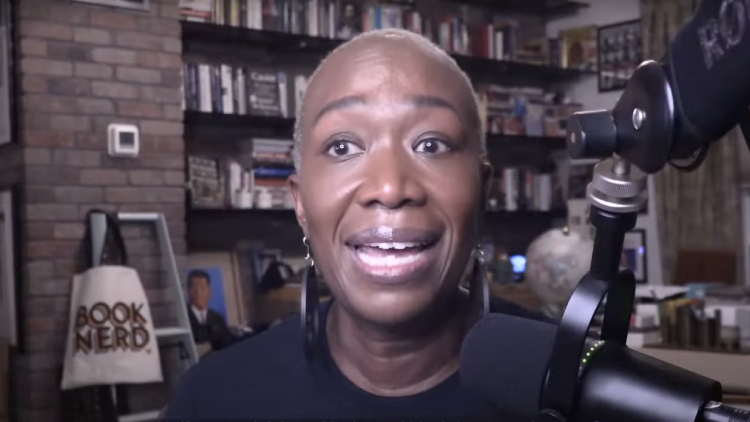
Introduction
Joy Reid’s latest inflammatory commentary—claiming that “mediocre white men never invented anything”—is not merely another misstep in an already controversial career. It is emblematic of a broader decline in standards within American broadcast journalism. Reid’s style of commentary, characterized by sweeping racial generalizations, historical distortions, and performative outrage, should not be confused with serious journalism. Rather, it represents an entertainment-driven model that prioritizes provocation over evidence. Her departure from MSNBC underscores not only the risks of this style but also the uneasy relationship between networks and hosts who operate at the intersection of activism and news.
Olivia Murray, American Thinker: Joy Reid’s Journalism: A Study in Rhetorical Excess and Institutional Failure
Joy Reid is not an intelligent person—that much has been clear since the moment she appeared on the media scene—but as time went on, she grew increasingly unhinged, becoming such a liability for the Democrats that eventually MSNBC cancelled her show in a “restructuring” process (after halving her salary), and she was relegated to self-production. About two months ago, she launched a YouTube channel, but it doesn’t appear to be very popular.
Four days ago, she appeared on another creator’s podcast for an episode titled, “How Mediocre White Men and Their Fragility Are Destroying America”.
According to these two idiots, white people are parasites, riding the coattails of incredible black intellectuals and inventors. Naturally, Ali and Reid didn’t name any specifics about who these achieving blacks were, because of course, this is a fictitious narrative. (If they had name-dropped Thomas Sowell or Booker T. Washington, I would have actually heard them out.)
Reid’s Style: Partisan Punditry Masquerading as Journalism
Joy Reid has long blurred the line between fact-based reporting and ideological grandstanding. Her recent remarks about “mediocre white men” fit a pattern of commentary that relies on identity-based caricatures instead of reasoned analysis. While journalism has room for sharp critique, Reid’s approach consistently lapses into racial stereotyping. This reduces complex issues into simplistic, combative narratives designed to generate viral outrage rather than genuine understanding.
Such tactics may build short-term attention, but they erode the core purpose of journalism: informing the public through fact, fairness, and clarity. By presenting rhetoric as reporting, Reid contributes to the very “post-truth” environment her network often condemns in its rivals.
Historical Pattern of Controversy
A single incident does not define Reid’s record. Over the years, she has faced backlash for:
- Past blog posts (2005–2009) that included homophobic content, which she initially denied before apologizing.
- Antisemitic and racially charged comments, both in archived writings and on-air segments.
- Inflammatory framing of political opponents, which often strays into ad hominem attacks rather than substantive critique.
This cumulative record raises the question: why did MSNBC continue to platform a host whose commentary repeatedly undermined journalistic standards? The answer lies in the network’s own dependence on provocative voices to maintain ratings in a crowded cable news market.
Why MSNBC Finally Cut Ties
Multiple reports suggest Reid’s removal was part of a broader restructuring of MSNBC’s lineup (The Guardian, Cincinnati.com). Yet Reid herself has said she was given no warning or explanation, speculating that her coverage of Donald Trump and Gaza may have contributed (NY Post).
Industry insiders point to three likely factors:
- Editorial Control – MSNBC executives reportedly discouraged Reid’s unfiltered use of social media, signaling discomfort with her unchecked style (The Daily Beast).
- Network Image – At a time when MSNBC sought to reposition itself with a more centrist lineup, Reid’s aggressive rhetoric made her a liability rather than an asset.
- Cumulative Pattern – While ratings were not catastrophic, Reid’s history of controversies likely weighed heavily in the decision.
In short, Reid was not dismissed because of one remark—but because her overall brand of journalism had become a reputational risk.
The Embarrassment to Journalism
Reid’s case highlights a deeper problem in American media: the replacement of rigorous reporting with activist entertainment. Instead of fostering informed debate, her commentary often amplifies resentment and division. This is not a personal indictment of her politics but a professional critique of her method. A journalist’s duty is to question power, clarify truth, and elevate discourse. Reid’s reliance on sweeping insults and racial generalizations does the opposite, debasing journalism into partisan performance art.
Conclusion: Lessons for the News Business
The collapse of Joy Reid’s position at MSNBC should serve as a cautionary tale for both journalists and networks. For journalists: passion must be tethered to principle, and critique must be rooted in evidence rather than broad character attacks. For networks: chasing outrage as a ratings strategy may deliver short-term gains, but it erodes long-term credibility.
If MSNBC’s decision signals a move back toward editorial discipline, it is a step in the right direction. But if a different brand of spectacle simply replaces Reid’s departure, the underlying problem remains unresolved.
Ultimately, Reid’s style of “so-called journalism” is an embarrassment to the news business because it confuses activism with reporting, undermines trust in media, and contributes to the polarization it claims to challenge.
